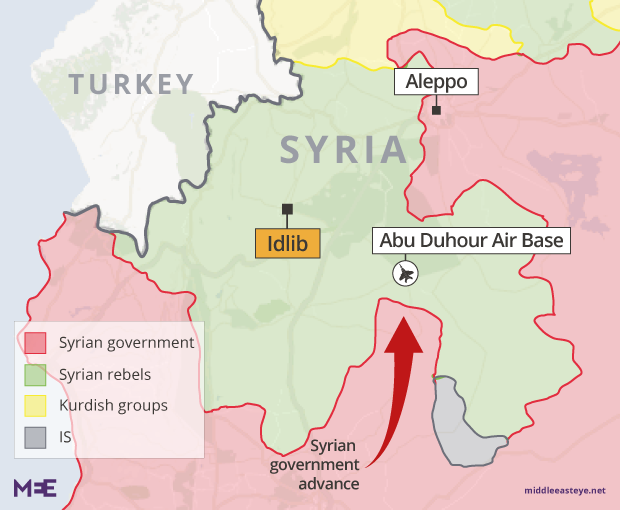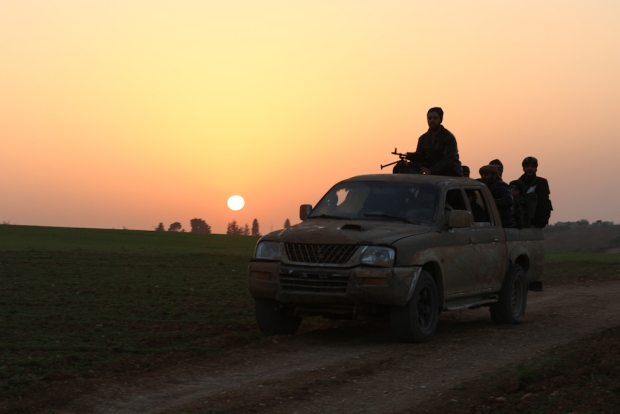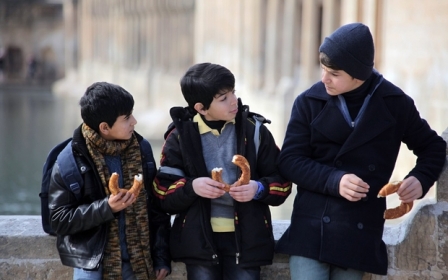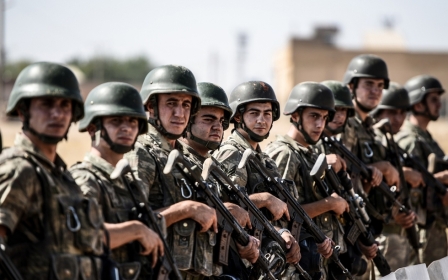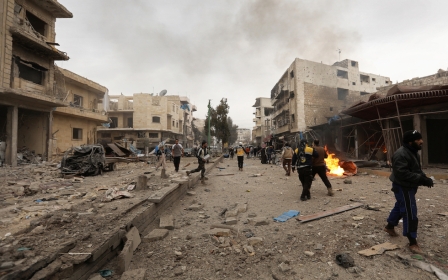Idlib's ragtag rebels attempt unity to save fading Syrian revolt
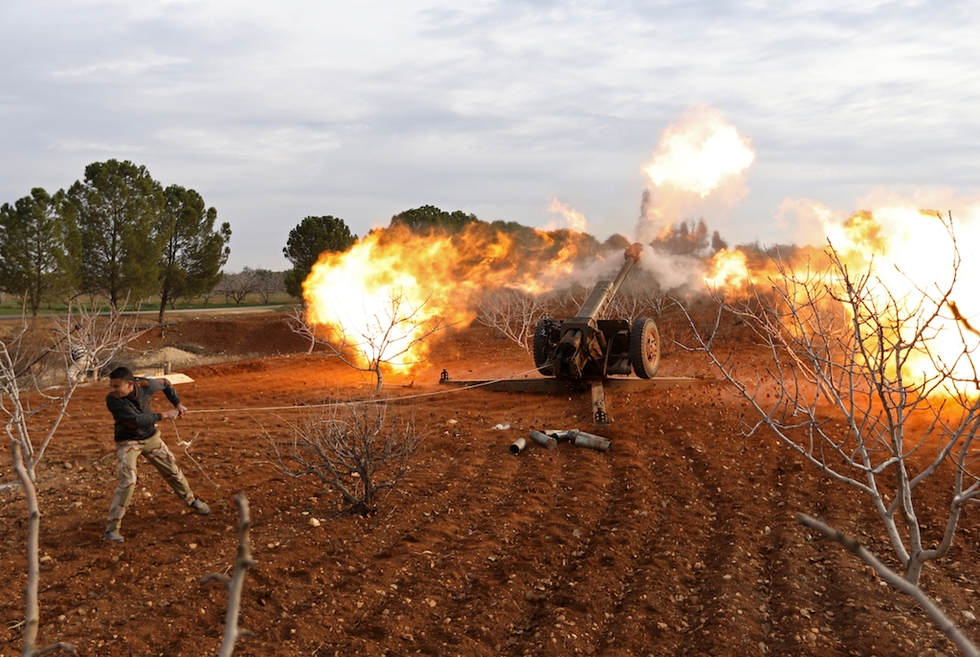
The province of Idlib in northern Syria remains one of two last remaining rebel strongholds in the country and its future could determine whether Bashar al-Assad finally crushes the seven-year uprising.
As forces loyal to the president continue to advance into the beleaguered province, residents brace themselves for a brutal assault, similar to that which saw rebel-held Aleppo fall in 2016.
Hiba, a student in the town of Binnich, east of Idlib city, said she expected a "heinous revenge" from Assad's forces when they finally reached her.
As long as the regime does not differentiate between civilians and military people, we expect arbitrary arrests and systematic massacres, so we are all targeted in liberated areas
- HIba, student in Binnich, Idlib
"Fear and anticipation dominate us," she told Middle East Eye. "Believe me, this fear has become a painful obsession."
She did not know whether the motley crew of rebel fighters facing down Assad's loyalists, backed by Russian air power, would be able to protect them this time.
Having already fled Assad's army six times since 2011, Hiba said there was nowhere left to go.
"As long as the regime does not differentiate between civilians and military people, we expect arbitrary arrests and systematic massacres, so we are all targeted in liberated areas," she said.
"There is no place to escape."
Last week, the remaining rebel forces in Idlib announced the formation of a united front to defend their territory.
“All the factions working in Idlib and Hama have agreed to joint action on a number of axes,” said Mahmoud Mahmoud, a spokesman for the rebel faction Jaish al-Izza, speaking to Syria Direct.
According to Syria analyst Charles Lister, the rebel grouping - which includes Ahrar al-Sham, Faylaq al-Sham, Nour al-Din al-Zinki and others - received weaponry including rocket launchers, armoured vehicles and mortars from Turkey before a counterattack which began on Thursday.
It challenged the government forces' northward push into eastern Idlib, where they aim to capture the Abu Duhour military air base.
In an interview with the pro-opposition OGN TV, a commander from the Jaish Ahrar organisation said that his forces - as part of the operations room "And indeed, Allah is competent to give them victory" - a name inspired by Quranic verse - had managed to capture a number of villages back from government forces.
The eventual picture in my mind is that the regime largely retakes control of the province, even though that will likely be a slow process
- Aymann Jawad al-Tamimi, analyst
"In cooperation with the brethren from Ahrar al-Sham and Jaish al-Izza," he said from the "liberated" village of al-Khwain, “Tel Maraq town was liberated - the current operation is on Atshan and Hamidiya.”
But rebel forces have long suffered infighting and disunity and, as a result, Idlib has since 2017 been effectively controlled by HTS, a coalition largely dominated by Jabhat Fateh al-Sham (JFS), which was affiliated to al-Qaeda before announcing - to much skepticism - it was breaking away.
Much of the international community has been alarmed by the group's growth in the region, fearing that - following the effective collapse of the Islamic State group - HTS could prove to be next major "jihadist" threat.
The other rebel groups have been severely marginalised since the summer of 2017 when HTS apparently seized control of the province from the previously powerful Ahrar al-Sham organisation. Many of the remaining rebel formations in Idlib are now effectively a direct proxy for Turkey, who control chunks of Idlib and Aleppo.
The current push by rebel forces is viewed by some analysts as driven by Turkey in an attempt to punish Russia and Iran for failing to uphold a policy of establishing "de-escalation zones", one of which was supposed to have applied in Idlib.
Aymann Jawad al-Tamimi, a fellow at the Middle East Forum, said that although Turkey was angry at the new push by pro-Assad forces, it was unlikely the advance could be halted.
"The eventual picture in my mind is that the regime largely retakes control of the province, even though that will likely be a slow process," he said.
HTS 'disaster'
HTS, which is thought to have more than 20,000 fighters, is the dominant force in Idlib and the weakness of the other rebel groups - located largely in the south of the province - has allowed it to effectively rule unchallenged.
Speaking to the opposition media outlet Syria Call, Ahrar al-Sham's spokesperson Mohammed Abu Zeid described the extent of the "disaster" that befell his organisation following their routing by HTS.
He claimed that the militants had captured over 1000 light weapons "including more than 700 rifles, 120 machine guns and 80 launchers" as well as "dozens of pickups, tens of vans and cars" and "more than 150 bases" since they launched their July assault.
He said that the "main economic resources" of Ahrar al-Sham, who were once thought to be a stronger and more numerous group than HTS, had now been captured "almost entirely by Tahrir al-Sham".
Nevertheless, he said Ahrar al-Sham "will have its distinctive fingerprints during the next stage, God willing".
Although many of the rebel factions in Syria have a political Islamist bent, the repressive brand of "Salafi jihadism" espoused by HTS has antagonised much of the local population under their control.
The last year has seen repeated demonstrations against the group, particularly in the town of Maarat al-Numan, as HTS continued to liquify more secular groups affiliated to the Free Syrian Army and others.
Abdulkafi Alhamdo, a media activist based in the town of Atarib on the edge of Idlib province, said that the majority of people in Idlib did not support HTS' vision and would rather see the other groups in the forefront.
“For sure, HTS are not like Assad, IS or al-Qaeda in general, but they still have some thoughts which are not suitable for the mentality of the free Syrian people - those people who refused Assad, who refused tyranny, those people who are really seeking democracy," he explained.
He said that were the other rebel groups to unite, they would be stronger than HTS - but that even then, it would likely be futile in the face of Assad and his supporters.
“The rebel factions, they receive only light weapons," he said.
"What can guns do against planes, against rockets? What can guns do with barrel bombs that might destroy a neighbourhood? We need help to be able to defend ourselves.
“We might be able to defend ourselves for a specific time - but for sure, at the end, we are going to die because Assad has limitless men, weapons and money. The rebels don't.”
'Terrifying possibilities'
On Monday, a number of Syrian opposition envoys, representing the FSA, met US officials to try to convince them to restart the CIA-training programme which was unceremoniously cancelled in July by the US president, Donald Trump.
Mustafa Sejari, a senior official in the FSA, told Reuters the envoys had tried to argue the need to combat "Iranian hegemony" in the Middle East, which has been a major bugbear of the Trump administration.
He called for the "resumption of aid and explained the dangers of leaving moderate FSA forces without support".
The hegemony of HTS in Idlib so far still appears unchallenged - the group controls Idlib city and the Bab al-Hawa crossing into Turkey, while its civil authority the Syrian Salvation Government has dissolved local civilian authorities and continues to attempt to centralise control under the militants.
With little appetite in the West to provide overt support to an area controlled by an al-Qaeda inspired group, and with main rebel backer Turkey seemingly more concerned about the northern enclave of Afrin, few are hopeful about a military defeat of the Syrian government war machine.
And as with the fall of Aleppo in December 2016, it appears that the reaction of foreign observers will be to sit on their hands as the last resistance to Bashar al-Assad is snuffed out.
"Terrifying possibilities await us," said Hiba. "We can be besieged and the Turkish border is closed, or the regime may invade our land and this will be truly a humanitarian disaster.
"Things are very ambiguous and we cannot expect anything. We just live in a miserable state."
Middle East Eye propose une couverture et une analyse indépendantes et incomparables du Moyen-Orient, de l’Afrique du Nord et d’autres régions du monde. Pour en savoir plus sur la reprise de ce contenu et les frais qui s’appliquent, veuillez remplir ce formulaire [en anglais]. Pour en savoir plus sur MEE, cliquez ici [en anglais].


